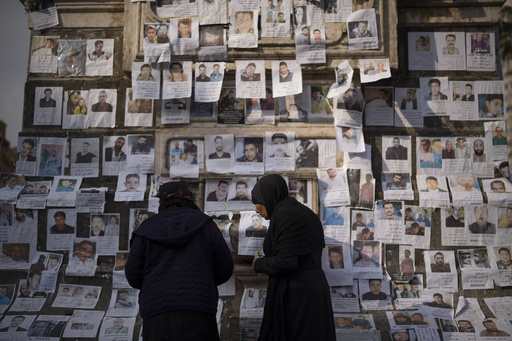
BEIRUT — A significant meeting took place on Sunday between a prominent Lebanese political figure and the insurgent leader responsible for the recent toppling of Syria’s President Bashar Assad, with both expressing optimistic sentiments for improved relations moving forward.
Walid Jumblatt, a major Druze politician, made headlines by being the first influential Lebanese leader to engage with Syrian representatives since the end of the Assad family’s 54-year rule just two weeks ago. Jumblatt has a historically tense relationship with Syria, having long criticized Syrian intervention in Lebanon. He holds the Assad family responsible for the assassination of his own father.
Ahmad al-Sharaa, who led the Sunni Islamist factions that captured Damascus this month, appeared in a formal suit and tie for the meeting. He has been actively engaging with diplomats and officials as the political landscape in Syria transforms following the fall of Assad, fostering hope among many Syrians who have endured over 13 years of civil unrest and strict international sanctions.
Jumblatt, a central figure for Lebanon’s Druze community, expressed his aspiration that Lebanese-Syrian relations would “return to normal.” He recalled the violent loss of his father, Kamal, in 1977 when he was ambushed near a Syrian military blockade as Syria intervened in Lebanon’s civil strife.
In the dialogue, al-Sharaa promised that Syria would refrain from interfering negatively in Lebanon’s affairs. He reiterated claims that the Assad regime was implicated in the assassination of former Lebanese Prime Minister Rafik Hariri in 2005, which spurred a series of targeted killings of notable opponents of Assad in Lebanon.
Following that notorious assassination, an international tribunal set up by the United Nations eventually concluded its investigation, having convicted three Hezbollah members, who are allies of Assad, in absentia. Hezbollah denied any connection to the bomb attack that killed Hariri.
Jumblatt called for accountability for those responsible for crimes against the people of Lebanon, as well as equitable trials for those who have committed offenses against Syrian civilians. He underscored the necessity of addressing these historical injustices.
On a different note, al-Sharaa announced that former insurgent groups had reached a consensus to form a unified military command and to establish a defense ministry, emphasizing that weapons should be under the state’s authority.
“The principles of governance differ from those of a revolution,” he stated, reiterating the demand for relief from international sanctions.
In parallel developments, Iran’s Supreme Leader asserted that younger Syrians would resist the newly established government following Assad’s removal, while again placing blame on the United States and Israel for causing instability in Syria. Iran played a pivotal role in supporting Assad throughout the civil war, which commenced after his violent repression of peaceful protests. Syria has long been a vital route for Iranian support to Hezbollah.
Ayatollah Ali Khamenei declared on Sunday that “the young Syrian has nothing to lose” and faces serious uncertainty in the aftermath of Assad’s regime. He called on young Syrians to confront those he believes are responsible for the turmoil created in the country.
Khamenei also alleged that the U.S. and Israel are conspiring against Syria to seize its resources. Over the past year, Iran and its militant allies have encountered several strategic difficulties, notably with Israel engaging Hamas and impairing Hezbollah’s operations before last month’s ceasefire was reached in Lebanon.
In his remarks, Khamenei denied the idea that these groups serve as Iranian proxies, emphasizing that they fight based on deeply rooted beliefs. “If one day we plan to take action, we do not need proxy forces,” he affirmed.
Meanwhile, the head of a U.N.-sanctioned team tasked with investigating civil war crimes stated that they are collaborating with Syria’s new authorities to preserve vital evidence following Assad’s ousting. Robert Petit expressed gratitude for the opportunity to engage with the new regime, describing the discussions as “constructive.”
With journalists and activists gaining access to former detention facilities and mass graves, concerns mount regarding the potential destruction or loss of key evidence.
Syrian activist Wafa Mustafa, whose father disappeared in 2013, conveyed the deep distress experienced by families who seek clarity over their loved ones, stating, “No one gets to tell the families what happened without evidence, without search, without work, without effort.”
As the war created millions of refugees, a slow but ongoing return process has begun, with thousands attempting to reenter the country. Among them is Alaa Badawi, who sifted through rubble in hopes of locating traces of his home in Qaboun, an area known for its anti-government stance.
“Which is our house? Which is our alley? There is nothing visible,” Badawi lamented, as he painstakingly searched for any signs of what once was. After a determined effort, he did indeed find remnants, stating, “We finally discovered that this is our house,” though the emotion of finding belonging amidst devastation left him conflicted. “I do not know if I was happy to have located the house amid the rubble or upset because the house did not exist.”
Another returnee, Ziad Al-Hilli, who was recently released from captivity after Assad’s regime crumbled, found nothing but emptiness where his family’s home once stood, leaving him in despair over their fate.
